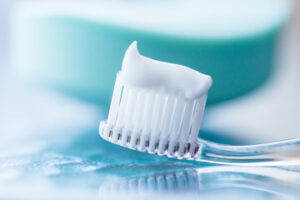Teeth are constantly losing and gaining minerals, which is why it’s important to use a remineralizing toothpaste. These toothpastes return minerals like calcium and phosphate to teeth, preventing damage from acidic foods and drinks.

One type of remineralizing toothpaste is made with nano hydroxyapatite, which mimics the composition of natural tooth enamel. It has been shown to be as effective as fluoride in remineralizing teeth.
Minerals in your saliva like calcium and phosphate help repair microscopic damage caused by acid attacks and make teeth stronger. This is known as remineralization. However, if you have a sugary diet or don’t brush enough, these minerals can be lost. Remineralizing toothpastes use specific natural and synthetic substances to help remineralize teeth. This can prevent cavities and tooth enamel erosion if used regularly.
One of the most popular ingredients in remineralizing toothpaste is calcium carbonate. It strengthens the enamel and reduces sensitivity. It also helps fill in the tiny cracks and fissures that develop during demineralization. It also helps remove plaque and freshen breath. You can find this ingredient in a wide variety of toothpastes, including many natural brands.
Another common mineral in remineralizing toothpaste is fluoride. It strengthens the enamel, prevents decay, and helps reverse early tooth loss. It can also reduce the sensitivity of teeth to hot and cold. It is an important ingredient in most remineralizing toothpastes, but it’s also found in traditional toothpastes.
Several other minerals are also found in remineralizing toothpastes, including xylitol and baking soda. They are a safe and effective way to remove plaque and whiten the teeth. These toothpastes are often made without added chemicals and are available in a range of flavors.
Hydroxyapatite is another popular mineral in remineralizing toothpaste. It strengthens the enamel and fills in the micron-sized holes that can cause sensitivity to touch, food, and temperature. These holes are called tubules, and the fewer there are, the less sensitivity a person experiences.
Remineralizing toothpastes are a great choice for people with sensitive teeth or gums. They are formulated with natural ingredients and contain no triclosan, saccharin, sodium laurel sulfate, or artificial coloring. They are also vegan, comply with EU norms, and don’t contain endocrine disruptors or parabens. They are a good alternative to traditional toothpastes, and they can be used twice a day for best results. To use, apply a small amount of toothpaste to a toothbrush and brush for at least two minutes. Brush your teeth and gums at least once a day, and brush thirty minutes after meals.
Xylitol
Xylitol is a little bit of an unsung hero in the oral health community. Researchers have known for decades that xylitol has strong cavity-fighting powers, but they held off on recommending it to patients until they had substantial evidence that it was effective. Once they did, we saw a big surge of xylitol-containing products-gums, candies, baking goods, toothpastes, mouthwashes, etc.
This is because xylitol does a number of things that help keep the mouth clean and reduce tooth decay, including remineralizing eroded enamel. It has the unique ability to attract calcium and phosphate from saliva, which helps strengthen teeth that have been weakened by acid or worn away by tooth grinding. It also raises pH levels in the mouth, keeping them in an alkaline state that is more protective of weakened enamel.
Moreover, because oral bacteria cannot metabolize xylitol, they are starved of their favorite food and can’t produce the acids that cause decay. This not only decreases plaque, but it also decreases the amount of streptococcus mutans in the mouth, one of the main bacteria associated with tooth decay.
Another thing xylitol does is promote saliva flow, which keeps the mouth well-hydrated and improves remineralization between brushings. In addition, when xylitol is combined with hydroxyapatite (more on this amazing ingredient below), it enhances saliva’s remineralizing abilities.
Remineralizing toothpastes are all the rage in dental circles right now. However, most remineralizing toothpastes contain high amounts of sodium fluoride (NaF), which can be dangerous for children and pregnant women. That’s why it’s important to choose a natural remineralizing toothpaste without NaF. The Better & Better remineralizing toothpaste contains xylitol, which is safe for kids and adults, as well as other healthy ingredients like zinc oxide, turmeric, neem extract, and aloe vera. Plus, it doesn’t contain saccharin, triclosan, or alcohol, which are all common irritants in conventional toothpastes. To use, simply apply a small amount to your toothbrush and gently brush your teeth for two minutes twice a day.
Fluoride
The enamel that protects the dentin of your teeth from dietary acids is constantly being demineralized and remineralized. The remineralizing process can be accelerated by using toothpaste that contains fluoride. Remineralizing toothpastes typically contain a higher level of fluoride than standard toothpastes, to help penetrate the enamel and strengthen it.
Remineralizing toothpastes also often contain ingredients that help to reduce tooth sensitivity, which can be caused by a loss of enamel, or from mineral deficiencies. For example, some toothpastes include calcium to help fill in the microscopic cracks in your teeth called fissures that can cause sensitivity and lead to enamel erosion.
Another ingredient in remineralizing toothpastes is zinc hydroxyapatite, which can bind to the weakened areas of your enamel and remineralize it. This helps to prevent sensitivity from developing and can also repair white spot lesions, which are an early sign of tooth decay.
The remineralizing effect of fluoride is increased when it is combined with other minerals that are found naturally in your body, such as zinc and magnesium. These minerals help to remineralize your teeth and reduce sensitivity, as well as reducing the risk of cavities by making it harder for bacteria to adhere to your enamel.
It is important to note that while remineralizing toothpaste can be very beneficial for your teeth, it is not a cure-all. The best way to keep your teeth healthy is to brush and floss twice a day, and to rinse with water after eating or drinking something acidic. Also, it is important to visit the dentist regularly and to eat a well-balanced diet.
It is recommended to use remineralizing toothpaste once or twice a day, depending on your dental health needs. If you are prone to enamel erosion or sensitive teeth, you may want to use remineralizing toothpaste more frequently, such as after meals or snacks. However, you should always talk to your dentist to determine the most appropriate frequency for you. They will be able to advise you on the best toothpaste for your unique needs.
Hydroxyapatite
The calcium phosphate compounds found in tooth enamel and bones, such as hydroxyapatite, are able to bond to weakened tooth enamel and promote the remineralization process. Unlike fluoride, which is limited to only the surface of enamel, hydroxyapatite is able to bind with damaged enamel and remineralize the deeper layers as well, fortifying teeth and alleviating tooth sensitivity.
Remineralizing toothpastes increase the mineral content of a tooth’s existing enamel, making it stronger and more resistant to damage. They also help fill in the tiny cracks that can develop on a tooth’s surface during demineralization, preventing bacteria from sneaking inside and causing tooth decay.
A 2017 study published in the journal BDJ Open found that toothpaste containing hydroxyapatite helped reverse molar incisor hypomineralization (MIH), which occurs when the enamel of your molars or incisors loses its luster and becomes pitted and rough. This can occur due to a sugary diet and bad oral hygiene habits, which weakens the enamel by decreasing its mineral content.
In the study, researchers compared MIH treated teeth that had been used with either a fluoridated toothpaste, a toothpaste with calcium sucrose phosphate, or a remineralizing toothpaste containing zinc hydroxyapatite. They then took an SEM image of each group’s tooth to examine the results. The remineralizing toothpaste with hydroxyapatite showed the highest rates of remineralization and lesion depth reduction.
Upon closer inspection of the SEM images, they discovered that the hydroxyapatite particles were able to physically bind to and penetrate a damaged tooth’s enamel, as well as fill in any holes, scrapes, or imperfections on its surface, fortifying it and eliminating sensitivity. This is a result of the principal of dental biomimetics, which states that dental materials should mimic naturally occurring properties of the tooth.
Remineralizing toothpastes with hydroxyapatite can begin to show results in just a few weeks or months of regular use. But, to maximize the benefits of this toothpaste, it’s important to follow good oral hygiene practices, including daily brushing and flossing. Your dentist can help you create a personalized oral care routine that will best protect your teeth.
